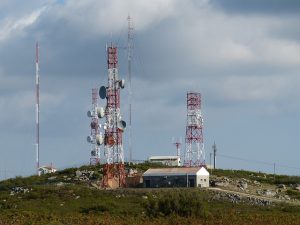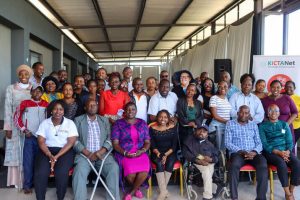Barrach
I am not against community networks in any way, but typically they struggle as larger telcos have much greater efficiencies (i.e. having billing, customer service etc systems) and also greater technical skills. They can probably get better pricing for equipment if they buy in large amounts too. If there is no business case for a telco, there may not be one for a community network. However that presumes that the telco understands the potential customer base in a certain area, and can mobilize it, and that may be an incorrect presumption and something that community networks may be able to do better… or in some form of partnership with telcos?
I should add that certainly competition is a good thing though!
Adam
From: kictanet [mailto:[email protected]] On Behalf Of Barrack Otieno via kictanet
Sent: Tuesday, May 29, 2018 7:00 AM
To: Adam Lane <[email protected]>
Cc: Barrack Otieno <[email protected]>; Kamunge, Njuguna <[email protected]>
Subject: Re: [kictanet] Access Gaps: What would it take? A proposal
Hi Ali,
ImHO we are discussing a public interest issue that might need a boost possibly from the Universal Service fund. Most of the ISPs that peer at KIXP are commercial entities that do so for commercial reasons not necessarily from a public interest perspective. During the ICT week, CA actually confirmed that the statistics we receive are normally population centric as opposed to being based on landmass. As infrastructure starts opening up the country such as the SGR, the International Airport in Isiolo , the Dual Carriage way to Mombasa, and rural electrification, people will start moving back to this areas that lack coverage and were hitherto considered unprofitable. I am yet to fully understand the long term business case of this projects funded by the Universal Service Fund and would like colleagues likes Adam to weigh in on the subject but it is my humble opinion that Community owned networks might be the way to go. Maybe Collins can share how they are surviving in Mashinani. I know the Telcos will claim that their network coverage extends to 90 % of Kenyans but we now know that this 90 % is in Nairobi, Mombasa and Kisumu, we need to change the narrative. Ensure the unconnected are connected and that the costs of the connections are low by all means.
Regards
On Tue, 29 May 2018 06:44 Ali Hussein via kictanet, <[email protected]<mailto:[email protected]>> wrote:
Collins
Just curious. Is there a regulatory bottleneck that would need to be unlocked? Reason I’m asking is why do we need to wait for the govt to mandate anyone? Can’t KIXP get on with it? Do we really need ‘permission’ for this?
Regards
Ali Hussein
Principal
AHK & Associates
Tel: +254 713 601113
Twitter: @AliHKassim
Skype: abu-jomo
LinkedIn: ke.linkedin.com/in/alihkassim
13th Floor , Delta Towers, Oracle Wing,
Chiromo Road, Westlands,
Nairobi, Kenya.
Any information of a personal nature expressed in this email are purely mine and do not necessarily reflect the official positions of the organizations that I work with.
On Mon, May 28, 2018 at 8:17 PM, Collins Areba via kictanet <[email protected]<mailto:[email protected]>> wrote:
@Ali & Others.
What does it take to push and actualize this? My suggestion would actually follow a very simple approach:
a) GOK, through CA mandates KIXP and other exchanges to provide countrywide service with presence at each of the 47 County headquarters as initial POPs.
b) Tier 1’s bid to operate and maintain redundant dark fibers to serve these IXPs, so that those IXP’s have multiple backhauls via multiple vendors.
c) IXP’s run an open access platform, offering standardized “Port charges” for 1G, 10G, 100G….. at each of these pops.
d) Tier 2 and ASP’s then pick this traffic from any of these points.
Immediate benefits:
a) IP transit in Kilifi @400 bob a meg. 🙂 Instead of current IP transit at EADC at 400 plus local loop at KES 5000. Packets cost eleven times more from Nairobi to Kilifi than they cost from Nairobi to Guangzhou. That cartel needs to die for affordable access to be realised.
b) Tier 3’s will have room to actually grow and become Tier 2 and Tier 1.
c) Players will be forced to innovate to remain relevant, resulting in better Value for money.
d) Fibers will be utilised way more efficiently. Fewer fibers also means less downtime. e.g a single fiber
On 28 May 2018, 4:14 PM +0300, I.kasyoki— via kictanet <[email protected]<mailto:[email protected]>>, wrote:
Eagerly following on this as well.
This will definitely be a game changer in regards to service penetration to marginalised areas.
[Syokinet Solutions]<htmlsig.com/t/000001C1QEB7>
[https://s3.amazonaws.com/htmlsig-assets/spacer.gif]
Ian Kasyoki /
[email protected]<mailto:[email protected]> / 0726815478
Syokinet Solutions
020-440-2983
P.O BOX 136-00519 Mlolongo
www.syokinet.co.ke<www.syokinet.co.ke>
—- On Mon, 28 May 2018 11:52:57 +0300 [email protected]<mailto:[email protected]> wrote —-
[https://mailtrack.io/trace/mail/b657a9b3a10768780db6af98676753c8f39bdd98.png?u=1528720]
I Second Collins on this approach.
Considering NOFBI is state funded (unless am wrong) so it’s the Kenyan taxes funding it and that KIXP via Tespok be given the mandate to offer ports at fixed rates accessible anywhere the NOFBI fiber terminates.
Sender notified by
Mailtrack<mailtrack.io?utm_source=gmail&utm_medium=signature&utm_campaign=signaturevirality5&> 05/28/18, 11:49:41 AM
Regards,
Job Muriuki,
Skype: heviejob
On Mon, May 28, 2018 at 11:42 AM, Collins Areba via kictanet <[email protected]<mailto:[email protected]>> wrote:
Hi all,
I have a rather interesting suggestion to the powers, power brokers and brokers that be. This is with regard to flattening the access environment countrywide. If you are at CA: Indulge me for a moment.
1) KIXP has proven over time that it is possible, from a technical standpoint to significantly drive traffic locally and in an organized manner. This works well where there is an XP, in the current scheme of things: Nairobi, and if TKL doesnt pull the plug, Msa.
2) If KIXP were operated like a distributed network, with switches in Kilifi, Mombasa, Garsen, Garissa, Thika, and all major towns in the country, so that providers would visit the nearest exchange point and get a port, loop charges would all but disappear.
3) All thats needed is for GOK to give KIXP a dark fiber pair into all major towns, and in exchange, for KIXP to offer 1G, 10G, 100G, etc at subsidized rates in any of these towns, and for NOFBI hosts to be “strongly asked” not to strong arm entrants by levying crazy cross connect or other barriers to entry.
Maoni?
_______________________________________________
kictanet mailing list
[email protected]<mailto:[email protected]>
lists.kictanet.or.ke/mailman/listinfo/kictanet
Twitter: http://twitter.com/kictanet
Facebook: www.facebook.com/KICTANet/
Domain Registration sponsored by www.eacdirectory.co.ke<www.eacdirectory.co.ke>
Unsubscribe or change your options at lists.kictanet.or.ke/mailman/options/kictanet/muriukin%40gmail.com
The Kenya ICT Action Network (KICTANet) is a multi-stakeholder platform for people and institutions interested and involved in ICT policy and regulation. The network aims to act as a catalyst for reform in the ICT sector in support of the national aim of ICT enabled growth and development.
KICTANetiquette : Adhere to the same standards of acceptable behaviors online that you follow in real life: respect people’s times and bandwidth, share knowledge, don’t flame or abuse or personalize, respect privacy, do not spam, do not market your wares or qualifications.
_______________________________________________
kictanet mailing list
[email protected]<mailto:[email protected]>
lists.kictanet.or.ke/mailman/listinfo/kictanet
Twitter: http://twitter.com/kictanet
Facebook: www.facebook.com/KICTANet/
Domain Registration sponsored by www.eacdirectory.co.ke<www.eacdirectory.co.ke>
Unsubscribe or change your options at lists.kictanet.or.ke/mailman/options/kictanet/i.kasyoki%40syokinet.co.ke
The Kenya ICT Action Network (KICTANet) is a multi-stakeholder platform for people and institutions interested and involved in ICT policy and regulation. The network aims to act as a catalyst for reform in the ICT sector in support of the national aim of ICT enabled growth and development.
KICTANetiquette : Adhere to the same standards of acceptable behaviors online that you follow in real life: respect people’s times and bandwidth, share knowledge, don’t flame or abuse or personalize, respect privacy, do not spam, do not market your wares or qualifications.
_______________________________________________
kictanet mailing list
[email protected]<mailto:[email protected]>
lists.kictanet.or.ke/mailman/listinfo/kictanet
Twitter: http://twitter.com/kictanet
Facebook: www.facebook.com/KICTANet/
Domain Registration sponsored by www.eacdirectory.co.ke<www.eacdirectory.co.ke>
Unsubscribe or change your options at lists.kictanet.or.ke/mailman/options/kictanet/arebacollins%40gmail.com
The Kenya ICT Action Network (KICTANet) is a multi-stakeholder platform for people and institutions interested and involved in ICT policy and regulation. The network aims to act as a catalyst for reform in the ICT sector in support of the national aim of ICT enabled growth and development.
KICTANetiquette : Adhere to the same standards of acceptable behaviors online that you follow in real life: respect people’s times and bandwidth, share knowledge, don’t flame or abuse or personalize, respect privacy, do not spam, do not market your wares or qualifications.
_______________________________________________
kictanet mailing list
[email protected]<mailto:[email protected]>
lists.kictanet.or.ke/mailman/listinfo/kictanet
Twitter: http://twitter.com/kictanet
Facebook: www.facebook.com/KICTANet/
Domain Registration sponsored by www.eacdirectory.co.ke<www.eacdirectory.co.ke>
Unsubscribe or change your options at lists.kictanet.or.ke/mailman/options/kictanet/info%40alyhussein.com
The Kenya ICT Action Network (KICTANet) is a multi-stakeholder platform for people and institutions interested and involved in ICT policy and regulation. The network aims to act as a catalyst for reform in the ICT sector in support of the national aim of ICT enabled growth and development.
KICTANetiquette : Adhere to the same standards of acceptable behaviors online that you follow in real life: respect people’s times and bandwidth, share knowledge, don’t flame or abuse or personalize, respect privacy, do not spam, do not market your wares or qualifications.
_______________________________________________
kictanet mailing list
[email protected]<mailto:[email protected]>
lists.kictanet.or.ke/mailman/listinfo/kictanet
Twitter: http://twitter.com/kictanet
Facebook: www.facebook.com/KICTANet/
Domain Registration sponsored by www.eacdirectory.co.ke<www.eacdirectory.co.ke>
Unsubscribe or change your options at lists.kictanet.or.ke/mailman/options/kictanet/otieno.barrack%40gmail.com
The Kenya ICT Action Network (KICTANet) is a multi-stakeholder platform for people and institutions interested and involved in ICT policy and regulation. The network aims to act as a catalyst for reform in the ICT sector in support of the national aim of ICT enabled growth and development.
KICTANetiquette : Adhere to the same standards of acceptable behaviors online that you follow in real life: respect people’s times and bandwidth, share knowledge, don’t flame or abuse or personalize, respect privacy, do not spam, do not market your wares or qualifications.
_______________________________________________
kictanet mailing list



